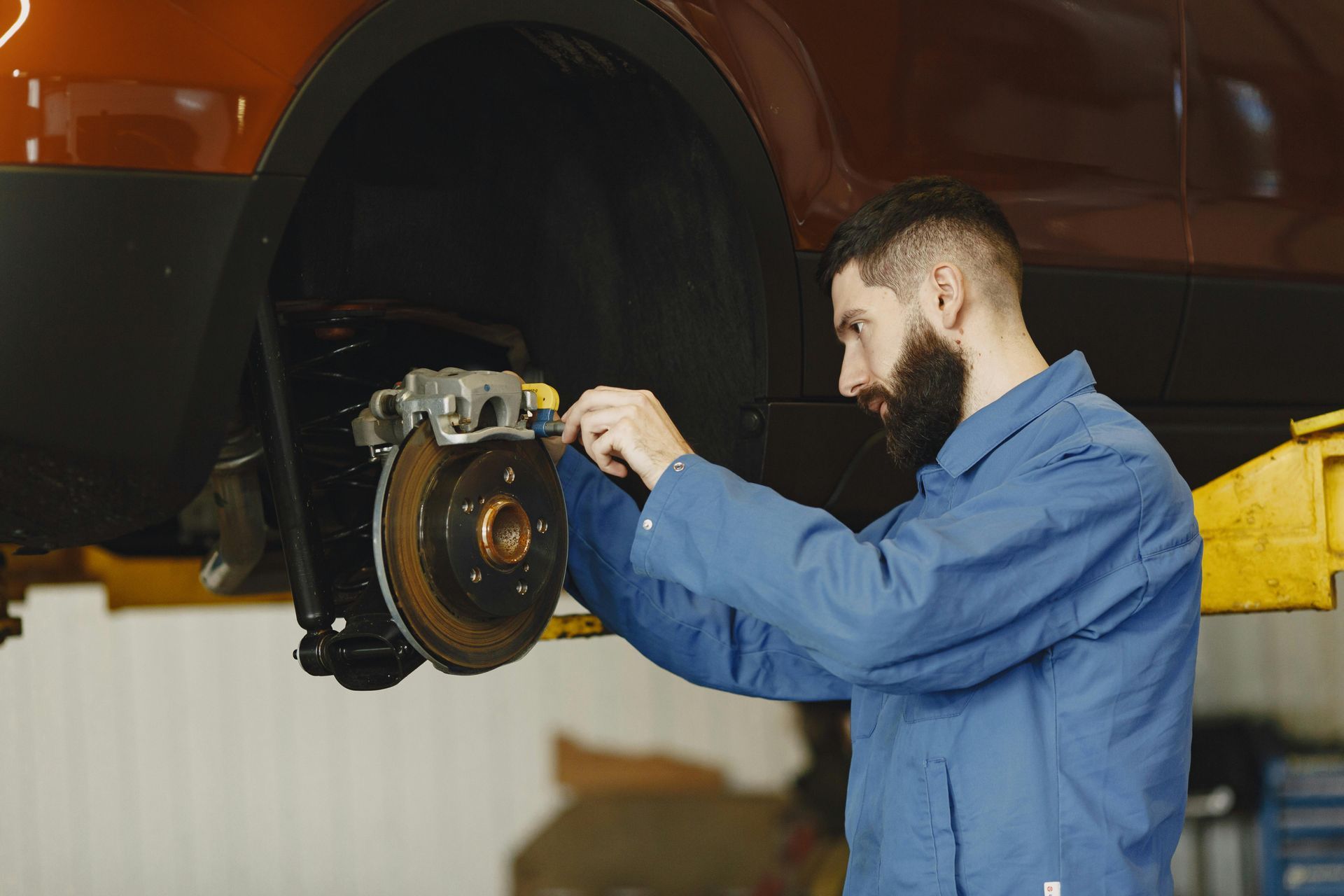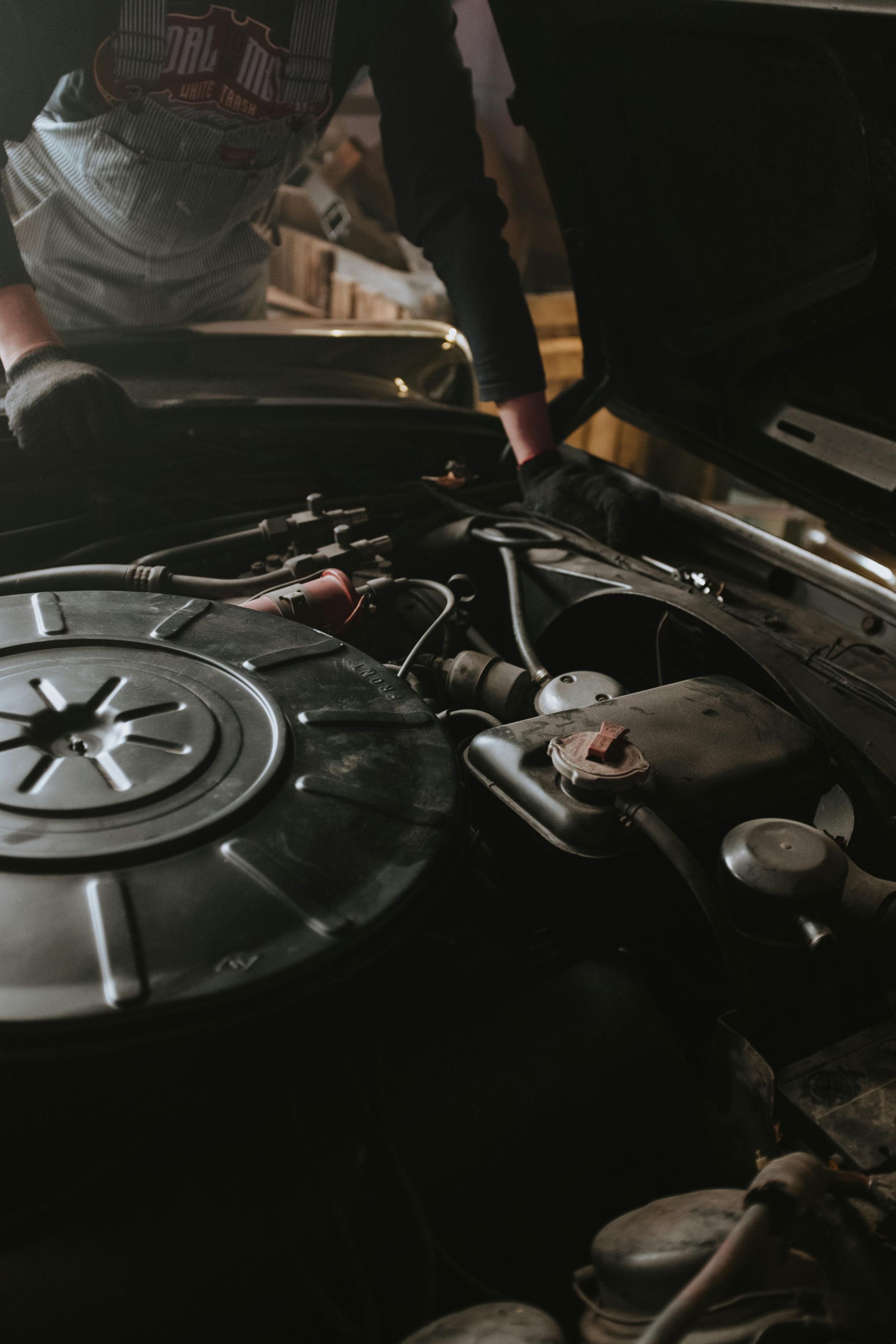How to Identify Brake Problems in Royal Oak, MI
Every car owner should know how to identify brake problems. Your car's brakes are crucial for your safety on the road. Recognizing brake issues early can save you from costly repairs and dangerous driving conditions.
Strange noises like squealing or grinding when you brake are clear warning signs. You might also notice your car pulling to one side when braking or a soft, spongy feel when pressing the brake pedal. Don't ignore vibrations or your brake warning light if it comes on.
We recommend paying attention to how your vehicle responds when you slow down. If stopping takes longer than usual or requires more pressure on the pedal, your brakes may need attention. Regular brake checks can help catch problems before they become serious hazards.
Key Takeaways
- Unusual sounds, pulling to one side, or a soft brake pedal are key indicators of brake problems.
- Regular inspection of your brakes prevents expensive repairs and ensures your safety.
- Prompt attention to warning signs like vibrations or longer stopping distances can prevent brake failure.
Recognizing Common Brake Issues
Your vehicle's braking system gives clear warning signs when problems develop. Identifying these issues early can prevent costly repairs and keep you safe on the road.
Symptoms of Brake Problems
Watch for changes in how your brake pedal feels. A soft or spongy brake pedal often indicates air in the brake lines or low brake fluid. If you need to press the pedal closer to the floor than usual, this suggests a serious issue requiring immediate attention.
Another warning sign is when your vehicle pulls to one side during braking. This typically means a stuck caliper or uneven brake pad wear.
Dashboard warning lights shouldn't be ignored. When your brake warning light illuminates, check your brake fluid level first. If it's adequate, have a professional inspect your braking system.
Visible leaks of brake fluid—recognizable by its light brown color and slippery texture—indicate a potentially dangerous system failure.
Brake Noise and Vibration
Squealing or squeaking noises often signal worn brake pads. This happens because the wear indicators (small metal tabs) contact the brake rotor when pads thin out.
Grinding sounds are more serious and typically mean your brake pads have worn completely. Metal-on-metal contact damages rotors and creates a harsh grinding noise.
Pulsating brake pedals or steering wheel vibration during braking usually indicates warped rotors. This happens when rotors overheat and become distorted.
Clicking or rattling sounds might mean loose brake pads or hardware. These components can shift during braking, causing distinctive noises.
Drum brakes often produce different sounds than disc brakes when failing. A hollow drumming noise while braking suggests issues with drum brake components.
Reduced Stopping Power
Longer stopping distances are a critical warning sign. If your vehicle takes longer to stop than it used to, your brakes may be worn or your brake fluid might be compromised.
Brake fade occurs when brakes overheat and temporarily lose effectiveness. This commonly happens during mountain driving or when towing heavy loads.
We sometimes notice reduced braking power in wet conditions. This "hydroplaning" effect can be worsened by worn brake components or tires.
Inconsistent brake response—where the same pedal pressure produces different stopping power—indicates potential air in the lines or a failing master cylinder.
Emergency braking capabilities should be tested periodically in a safe environment. If your vehicle won't stop quickly in an emergency braking test, professional inspection is necessary.
The Causes Brake Wear & Tear
Brakes naturally degrade over time due to several factors. Knowing what causes brake wear helps us catch problems before they become dangerous or expensive.
Brake Pad Wear and Tear
Brake pads are designed to wear down gradually as they press against the rotors to slow your car. Normal driving causes this wear, but certain habits make it happen faster. Heavy braking, especially at high speeds, creates excessive heat and friction that accelerates pad deterioration.
Stop-and-go traffic is tough on brakes too. Each time we press the brake pedal, a small amount of pad material wears away. In city driving, this happens constantly.
Driving in hilly areas puts extra strain on brakes. When going downhill, many drivers ride their brakes instead of downshifting, which creates more heat and wear.
Common signs of worn brake pads:
- Squealing or grinding noises
- Reduced braking performance
- Vibration when braking
- Brake warning light on dashboard
Checking Brake Fluid Levels
Brake fluid is the lifeblood of our hydraulic brake system. It transfers the force from the brake pedal to the brake components at each wheel. Over time, this fluid can become compromised.
Brake fluid naturally absorbs moisture from the air, which lowers its boiling point. When fluid gets too hot, it can form vapor bubbles that create a spongy brake pedal feel. This condition, called brake fade, reduces stopping power significantly.
We recommend checking brake fluid levels monthly. The reservoir is typically transparent, allowing you to see if the fluid is between the minimum and maximum marks.
Warning signs of brake fluid issues:
- Low fluid level in reservoir
- Dark or dirty fluid (should be clear to amber)
- Spongy brake pedal
- ABS warning light illuminated
- Leaks under the car near wheels or near the master cylinder
The Condition of Brake Calipers and Rotors
Calipers and rotors work together to create the friction needed to stop your car. Calipers house the brake pads and squeeze them against the rotors when you press the brake pedal.
Rotors can warp from excessive heat, especially during hard braking. This warping causes a pulsating sensation in the brake pedal when slowing down. Rotors also develop grooves and scoring over time as the brake pads wear against them.
Calipers can develop problems too. Seals and bushings can deteriorate, allowing brake fluid to leak. Calipers can also stick, causing brakes to drag or apply unevenly.
Seasonal changes affect these components as well. In winter, road salt and moisture can accelerate corrosion. In summer, extreme heat can exacerbate existing issues.
Warning Signs for Immediate Attention
Some brake problems need to be addressed right away to ensure your safety on the road. We've compiled a list of critical warning signs that require immediate attention.
Strange Noises
- High-pitched squealing or squeaking
- Grinding or growling sounds
- Clicking or rattling when braking
These noises often indicate worn brake pads, damaged rotors, or loose components in your braking system.
Physical Sensations
- Vibration or pulsation in the brake pedal
- Car pulling to one side when braking
- Spongy or soft brake pedal
- Brake pedal going too far to the floor
When your car behaves differently during braking, it's telling you something is wrong. These sensations often point to warped rotors, uneven pad wear, or potential fluid leaks.
Visual Signs
- Warning light on dashboard
- Fluid leaks under the vehicle (brake fluid is clear to brownish)
- Thin brake pads (visible through wheel spokes)
- Rust or grooves on brake rotors
We recommend pulling over safely if you experience any of these warning signs while driving. Continuing to drive with severe brake issues puts you and others at risk.
Regular maintenance can prevent many brake problems. But when these warning signs appear, it's best to have your vehicle inspected by a professional mechanic as soon as possible.
Why Choose First Call Auto Care for Brake Service?
At First Call Auto Care, we bring over 50 years of specialized brake repair experience to every vehicle that enters our shop. We service all makes and models, ensuring your vehicle receives expert care regardless of its brand or age.
Our certified technicians are specifically trained to diagnose and repair all brake system components. We thoroughly inspect brake pads for wear patterns, examine calipers for proper operation, and check brake lines for potential leaks or damage.
We use only high-quality replacement parts that meet or exceed manufacturer specifications. This ensures your brake system performs reliably when you need it most.
Our comprehensive brake service includes:
- Complete brake pad inspection and replacement
- Brake caliper cleaning and lubrication
- Professional assessment of pad wear indicators
- Thorough brake line inspection for leaks or damage
We understand that strange noises or poor braking performance can be concerning. That's why we take the time to explain our findings in clear, straightforward terms.
Our transparent pricing means no surprises when it's time to pay. We provide detailed estimates before beginning any work.
Safety is our top priority. We won't let you drive away with compromised brakes, and we'll help you understand the importance of regular brake maintenance.











